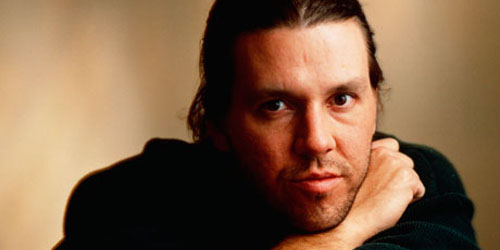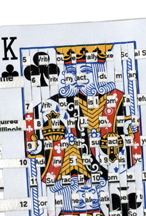Clear statement of purpose: this is not exactly a review of The Pale King, David Foster Wallace’s unfinished novel. So what is then? A few words, thoughts, reactions, sentiments, ruminations that taken together, I think, may give a taste of what the novel has to offer.
•
Strange way to start a review to point out that a quote mark might be missing at ‘To tell the truth…’ on page 500. A ridiculous observation, no? And yet I couldn’t help thinking when I noticed it that even this inconsequential moment hints at the sadness that lives at the edge of every sentence of The Pale King. David Foster Wallace’s suicide in 2008 has closed off the possibility that his novel will ever be finished, or that the minor typographical error on page 500 will ever be corrected by him. And knowing his legendary fussiness about all things grammatical, you know he would have.
•
The all-encompassing sadness mentioned above attaches to the novel’s beautiful sentences, of which there are more than can be counted, because each one harbors the loss of all that might have come after. That possibility gone for him of writing the sentence beyond the current one that is the hope of all writers; that tomorrow the combination of words that finds its way to the page will just destroy everything that went before it.
•
Sadness, sure, sure, sure. But the book is so funny, so often. The humor is at times slapstick and obvious, which is great and a DFW signature, but in other cases, it’s more subtle, jokes within jokes, or jokes about jokes. I’ll give one example that may contain a mix of these formats (though this is always risky because you won’t necessarily see the humor, especially out of context). This happens on page 241, when an important character, who has already been shown to be more than a little eccentric and maybe compulsively attentive, is going to an appointment after an epic Chicago snowstorm:
It was very quiet, and so bright that when you closed your eyes there was only a lit-up blood-red in there. There were a few harsh sounds of snow shovels, and a high distant snarling sound that I only later remembered as being one or more snowmobiles on Roosevelt Road. Some of the yards’ snowmen wore a father’s old or cast-off business hat. One very high, clotted drift had an open umbrella visible at its top, and I recall a frightening few minutes of digging and shouting downward into the hole, because it almost looked as if a person carrying an umbrella might have gotten abruptly buried in mid stride.
Now what I love about this is how the character rushes to the umbrella in the snowdrift and not only begins digging but actually shouts to see if its owner is buried in the snow. I love the deadpan. But I quoted more than was needed because I also love the lead-in: how his eyes are closed, the sounds he hears, the nice double hyphens: lit-up blood-red—there’s probably a term in rhetoric for that—the fathers’ old hats on the snowmen, and only then the umbrella, the crisis—that begins with the blood-red in there.
•
Adam Kirsch of The New Republic didn’t much care for the chapters in which a character named David Wallace shows up and becomes a part of the story. (I’ll link but it’s behind a paywall.) This David Wallace has just been suspended from his prestigious Eastern college for having written essays for pay for rich lazy students, returning in disgrace to his home in the Midwest to take a temporary job at an IRS processing center. DFW of course was never suspended from Amherst, where he wrote theses in both English and philosophy, both of which were published, and is remembered as one of the most extraordinary students in the school’s history. But I thought these fake memoir scenes were really funny. First of all, there’s the “Author’s Foreword,” inserted at Chapter 9, in which David Wallace advances an almost Kafkaesque set of elaborately flawed arguments to prove that the memoir really is a memoir and not fiction, including an account of Byzantine discussions that supposedly took place with the legal department of his publisher. The point of it all is to prove that the standard disclaimer on the book’s copyright page (‘The characters and events in this book are fictitious,’ etc.) was canceled out by the author’s foreword in Chapter 9, a logical impossibility—the disclaimer comes first, and so any effort to disclaim the disclaimer later must then be ‘fictitious’—but the absurdity only makes the ridiculous elaboration of the argument all the more enjoyable. Funnier still, for me, is the description of David Wallace’s bus trip to the town where the IRS processing center is located. Anyone who has ever taken a cross-country bus ride will recognize the lunacy barely held at bay within the bus compartment—perfectly and comically evoked.
•
Much of the novel takes place in the 1970s, a time in which I was present, though perhaps not fully accounted for. (I’m an older guy. Nice way of saying.) Anyway, I found myself thinking there might be a number of anachronisms in the novel regarding this period. For instance, on page 190 mention is made of everyone wearing Timberlands. Another sentence (I’ve lost where) speaks of Docksiders and Timberlands. Okay. Maybe so. I can only report that I don’t remember Timberlands being such a major force in that epoch. Docksiders yes. And something called Earth Shoes. Indeed I was the owner of (one) pair of Earth Shoes, which had a specially lowered heel supposedly conducive to happiness and peace. I am aware that having owned (even one pair of) Earth Shoes will expose me to ridicule among the young—if word ever gets out. So look, maybe everybody was wearing Timberlands, alright? Maybe I just missed the boat. It’s true—I missed many boats. But until I see some hard evidence to the contrary, I’m just not buying it.
Another example (though not necessarily of an anachronism, per se, so much as an interesting assertion about colloquial usage): on page 426, in a chapter in which two characters discuss the ’60s and its cultural referents, one character uses the word ‘groovy,’ and the other responds, “That’s just it. Nobody really said groovy. People who said groovy, or called you man were just playing out some fantasy they’d seen on CBS reports.” I don’t believe this to be quite accurate. Though it’s true groovy was not frequently used in the ’60s and early ’70s, certainly not so much as ‘far out,’ which for a time threatened the language development of an entire generation (and yet how odd it’s died out so utterly and completely), people did say groovy from time to time, and perhaps because there was a certain danger in using it, a certain approach to something inauthentic or even kitschy, its use was reserved for occasions of, one might even say, moment, or at least the word developed a special power as a result.
I’ll report a single use of it in this sense. At the end of my freshman year of college I was in love with a girl (and you can imagine what this means for a 19-year-old, a combination of sexual brio and confused overlapping incoherent longings acting together as a kind of meteor set loose in the naïve body over which no control, propulsive, almost insensate, a nearer approach to unconsciousness, etc.) who had been the girlfriend of my roommate for much of my freshman year. They had recently broken up, but I had been in love with her (see qualification above) for months. On a particular night we somehow ended up together, hanging out
Read More

